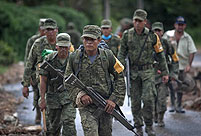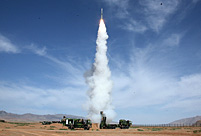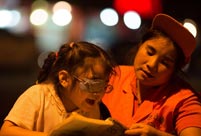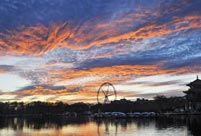Experienced traveler Liu Qiang has scrapped his plan to go to Hong Kong because of what he sees as obsenely high prices during the upcoming National Day holiday week.
"The cost of a four-day package tour to Hong Kong was about 2,500 yuan (around 400 U.S. dollars) previously, but it is as much as 5,000 yuan during the holiday," said Liu, 27, who works for an Internet company in Beijing.
The bad news for people like Liu is that both package and individual tour prices are expected to skyrocket from Oct. 1 when China's first tourism law comes into force.
These price rises are, in a large part, because of the law, but they are certain to unleash a torrent of gripes and acrimony in an already complaint-riddled industry. The hope is that the new regulations will help the industry to regulate iteslf in the long run.
The law includes provisions to counter the practice of zero, or even negative, fare tours. These are tours sold at or below cost price to lure ingenuous travelers who are then forced to purchase goods or tip guides while on holiday.
Travel agencies will be prevented from selling services at unreasonably low prices, or to profit by arrangements with designated stores. Travellers will not be obliged to accept any paid extras other than those specifically mentioned in contracts.
For time immemorial tour guides and travel agencies have been suspected of sharing profits with owners of stores, of taking commissions and kickbacks, but this will be illegal as of October.
"The domestic travel agency arena is a very competitive one. It's hard for travel agents to survive through low-price services alone," said Li Guang, general manager of the compliance office of the China Youth Travel Service (CYTS), one of China's leading travel agencies.
The law also address the problems of unfair competition and wanton price hikes which have bedevilled the travel industry for years and exasperate the public.
"These are deep-rooted problems which attract a lot of complaints. The the key to fixing these problems lies in strict implementation of the law," said Li Xinjian, a professor with the tourism management department in Beijing International Studies University.
Tourism insiders argue that the new round of price rises shows China's travel market returning to normal.
"Price wars were vicious in the past, while the recent rises are a sort of reasonable return to fair competition," said Wang Yanqi, director of the Research Center of Leisure Economy of China.
China's domestic travel market is the world's largest. Domestic tours totalled 2.96 billion in 2012, according to the China National Tourism Administration.
"The new law is not to impose restrictions on tourism shopping, but to target guides or agencies charging hidden commissions," said to Li Guang.
There are also calls for strict supervision of prices at popular locations.
"If prices were at normal levels in tourist attractions, there would be less scope for illegalities such as forced purchases and outrageous commissions," Wang Qiyan added.
 Storms leave 97 dead, 58 missing in Mexico
Storms leave 97 dead, 58 missing in Mexico New model of indigenous surface-to-air missiles testfired
New model of indigenous surface-to-air missiles testfired  118.28-carat diamond to be auctioned in HK
118.28-carat diamond to be auctioned in HK Maternal love under streetlight
Maternal love under streetlight Naked foreign student sits in the middle of a road in Haikou
Naked foreign student sits in the middle of a road in Haikou  Colorful Yunnan: Enjoy the natural beauty
Colorful Yunnan: Enjoy the natural beauty Harbin named Chinese city with most beautiful women
Harbin named Chinese city with most beautiful women For last four students, teacher couple sticks to post on island
For last four students, teacher couple sticks to post on island  When big sport stars were kids
When big sport stars were kids PLA's 38th Group Army conduct training
PLA's 38th Group Army conduct training Residences of the royal house of Savoy
Residences of the royal house of Savoy The last days of Wan Aihua
The last days of Wan Aihua Highlights at 12th National Games of China
Highlights at 12th National Games of China Beijing Film Academy welcomes freshmen
Beijing Film Academy welcomes freshmen Large mahjong party sets new world record
Large mahjong party sets new world recordDay|Week|Month